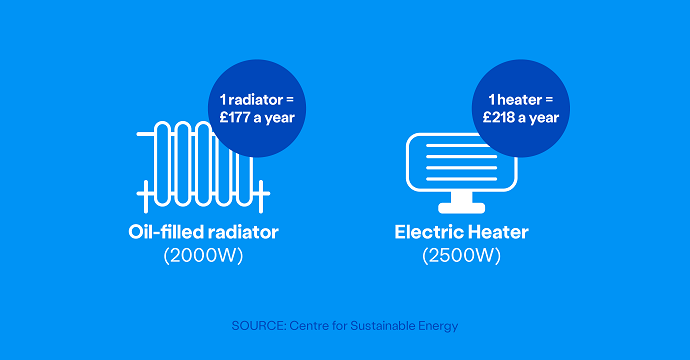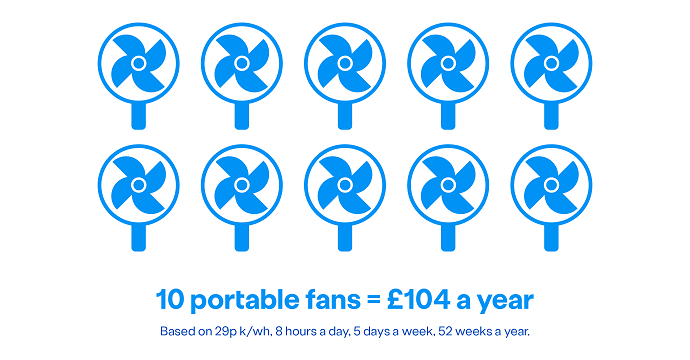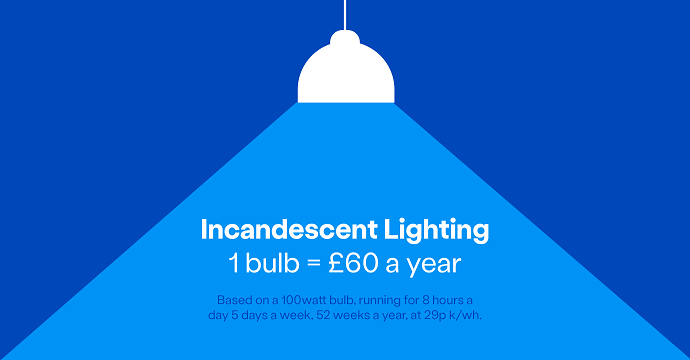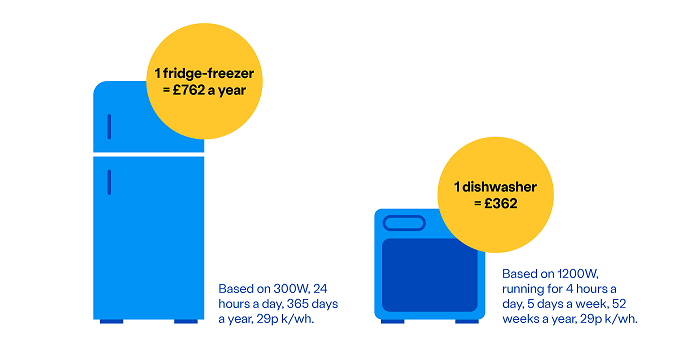16 October 2023

Business energy bills are often an area of concern as we head into the colder, darker more energy-intensive autumn and winter months. But despite ongoing economic factors squeezing already tight budgets, there are cost-saving opportunities for those who look.
Offices and factories are two of the top three buildings that consume the most gas and electricity[1]. So when it comes to business energy efficiency, even small adjustments to your energy consumption can make a big difference to your business energy bills. However, the biggest changes come from the most targeted interventions. So knowing exactly what appliances may be pushing up your energy bills is the first step to making significant savings.
With that in mind, we’ve taken a closer look at some of the most common energy-eating appliances below. Even though every business is different, they should give you a better understanding of what’s contributing to your energy bills and where to focus your efforts.
Please note, many of the running costs below are calculated by taking the power rating of the appliance, dividing by 1000 to give you the kWh figure, then multiplying that by the gas or electricity unit price. This gives you the cost to run the appliance every hour. However, it’s important to remember that these figures are to be used as a guide only.

According to the Department for Business, Energy & Industrial Strategy[2], now known as the Department for energy security and and net zero, heating accounts for as much as 49% of the energy used in office buildings.
Your business heating sources affect your business energy efficiency. They can be broken down into key areas:
Portable heaters
One electric heater used for only 2 hours a day, 5 days a week, for 6 months a year, will add £218 to your annual energy bill – whereas an oil-filled radiator would cost £177.
In many offices employees often use portable heaters to keep warm over winter. As well as competing with the building’s own heating and cooling system (which is a sure-fire way to drive up costs), these heaters are often expensive to run.
Conventional boilers
A 40 kWh boiler running for 8 hours a day, 7 days a week, 52 weeks a year, could add as much as £11,648 to your energy bill.
Conventional boilers, especially ones that are 15 years or older, may not run as efficiently as newer models or alternatives such as condensing boilers, heat pumps, CHP and Biomass boilers. As well as helping to keep your business safe, regular maintenance and servicing is vital to keeping your boiler running as efficiently as it’s capable of doing.
Desk fans
Just 10 desk fans used for 5 days a week, 6 months a year can add £104 to your annual bill.
As heatwaves over the summer months become more prevalent in the UK, portable desk fans have become an increasingly common sight in offices. In isolation, the costs may appear negligible. However, when used more frequently and in greater numbers across large offices, the costs can soon add up.

If Air conditioning units are used for 8 hours a day, 5 days a week and 52 weeks a year, it could add roughly £2,412 to your energy bills.
Depending on the size and model of your air con unit, it will likely use between 500W to 4,000W, which makes it one of the biggest contributors to your energy bill when in use.

One incandescent bulb running for 8 hours a day, 5 days a week, 52 weeks a year, can cost you as much as £60 a year.
Although LED lighting is increasingly commonplace, many older office buildings still use legacy light sources. However, if you were to replace them with LED technology you could reduce lighting energy costs by as much as 80%[3]. And given that lighting can account for as much as 14% of your energy bill[4], that can equate to a significant saving.
One desktop computer running for 8 hours a day, 5 days a week, 52 weeks a year, can add £104 a year to your energy bill.
PCs and laptops are an everyday part working in an office. But it’s interesting to know that although they account for as much as 60% of the energy consumed by office equipment, laptops actually use around 65% less electricity over a year than desktop PCs.

A 300W fridge-freezer could add around £762 to your energy bill, while a 1200W dishwasher would cost around £362 a year.
Most offices have at least one kitchen space for employees with a fridge-freezer and a dishwasher, so it’s useful to know how much energy these appliances cost to run over a year. A business with two, three or more of these appliances running at the same time will quickly see these costs mount up.
However, these appliances do benefit from regular cleaning and maintenance, as well as checks to make sure things like seals are still in good working order. This will all help to keep them working as efficiently as possible.
Online Account Management – the quick, easy way to get in control of your business energy. As well as having the ability to view bills and submit meter readings for accurate bills, you can also view your energy usage in our consumption charts to better manage costs.
View and download historical data for the previous year from Energy360 DataView, our free new platform designed to give you greater control over your business energy consumption. You can also get daily updates to see changes as they happen and see graphs and reports to find ways to save.
Request a smart meter so you can start tracking your business energy use
Sources and notes:
[1] https://assets.publishing.service.gov.uk/government/uploads/system/uploads/attachment_data/file/1086903/non_domestic_need_data_framework_2022.pdf
[2] https://assets.publishing.service.gov.uk/government/uploads/system/uploads/attachment_data/file/739699/180718_Business_Energy_Statistical_Summary_-_final_version.pdf
[3] https://assets.publishing.service.gov.uk/government/uploads/system/uploads/attachment_data/file/874898/Lighting_Technology_Information_Leaflet_April_2020.pdf
[4] https://ctprodstorageaccountp.blob.core.windows.net/prod-drupalfiles/documents/resource/public/Heating-Ventilation-guide.pdf
The views, opinions and positions expressed within the British Gas Business Blog are those of the author alone and do not represent those of British Gas. The accuracy, completeness and validity of any statements made within this blog are not guaranteed. British Gas accepts no liability for any errors, omissions or representations. The copyright in the content within the British Gas Business Blog belongs to the authors of such content and any liability with regards to infringement of intellectual property rights remains with them. See the Fuel mix used to generate our electricity. Read about making a complaint about your business energy.